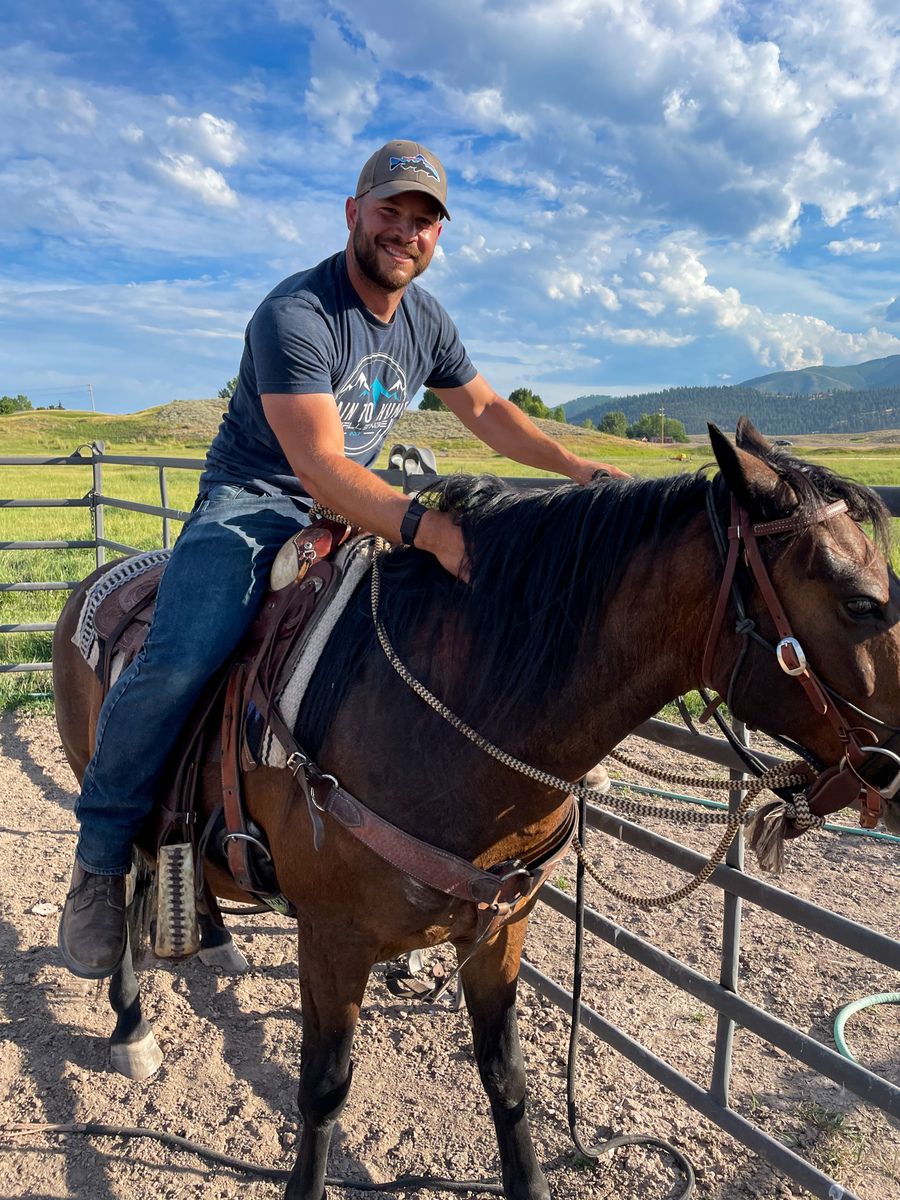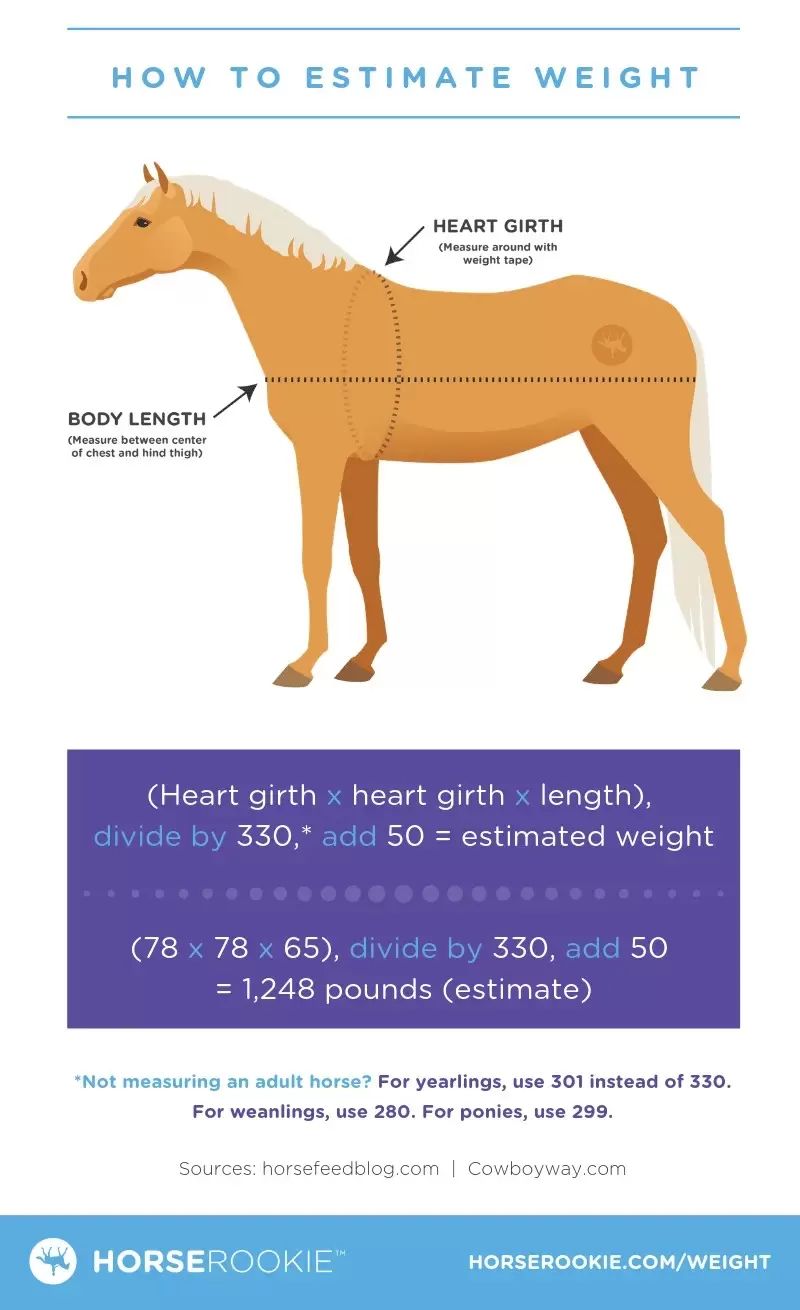
Are you a first-time horse owner and wondering how much does a horse weigh when fully grown?
Well, the answer to that question can vary greatly depending on the breed of horse in question.
On average, an average adult horse weighs between 800-1200 pounds. However, some breeds (such as draft horses) may weigh even more than that!
Understanding a horse's adult weight is important for managing their health, nutrition, and equipment needs as they reach maturity.
Please keep reading for more information about how to find out how much your horse weighs, how to estimate your horse’s weight without access to a scale, what factors might affect their weight, and how to maintain a healthy horse weight.
Understanding a Horse’s Body
You know, understanding your horse's body... it's absolutely essential if you're serious about keeping your animal healthy and happy. Now, when it comes to weight, there's a bunch of factors at play here - breed, age, what you're feeding them, and how much activity they're getting.
Take those massive draft horses like Clydesdales and Shires (and man, these guys are impressive!). We're talking about horses that can tip the scales anywhere between 1,800 and 2,200 pounds. These breeds... they're literally built for strength and stamina, allowing them to pull heavy loads like it's nothing.
But here's the thing - not all horses are created equal. Those lighter breeds? Arabians and Thoroughbreds typically weigh much less, usually sitting somewhere between 900 and 1,200 pounds. And you know what? These breeds are all about that agility and speed, which is exactly why they're such popular choices for riding and performance disciplines.
Most horses fall somewhere in between these extremes; but, it's crucial to remember that each horse individually may have a completely different healthy weight range depending on its unique build and genetics... yep, just like us humans!
So how do you figure out if your horse is at a healthy weight?
Well, that's where body condition scoring comes in (and this system is pretty neat, actually). It rates your horse's body condition on a scale from 1 - that's very thin - all the way up to 9, which means obese.
For most horses, you're shooting for a score of 4 or 5... that's considered ideal, showing you've got that perfect balance between muscle tone and body fat. Regularly checking your horse's body condition? It helps you stay on top of any changes and maintain their overall health, ensuring they stay within that healthy weight range for their breed and lifestyle.
How Can I Find Out How Much My Horse Weighs?
One of the most important things a horse owner needs to know is how much their animal weighs. This can help determine factors related to caring for a horse (such as medicine dosage). Fortunately, there are multiple ways to determine how much your horse’s body weight.
The first would be to get it to step on a livestock scale. The next time you are at the vet or a barn that may have a livestock scale on site, have your horse step on it. A livestock scale is specifically designed for large animals and is the most accurate tool for weighing horses. Yes, its weight may vary, but note your horse's current weight and current physical condition as a reference and baseline.
But what do you do if you don’t have access to a scale? Estimation methods, such as using a weight tape or body measurements with mathematical formulas, can provide an approximate weight, though not as precise as a livestock scale.
Horse Weight Tapes

A horse weight tape is a long measuring tape or strip that you wrap around your horse’s girth. The placement of the weight tape is critical, as it needs to go around the widest part of the barrel (right behind the front legs) to accurately measure the horse's girth.
Next, you will need to measure your horse’s body length. The horse's body length is measured from the point of the shoulder to the point of the buttock.
The combination of x heart girth and x body length measurement will give you a great indication of your horse’s current weight, as these are the key measurements used in the weight estimation formula.
Here is a visual of this simple horse weight calculation.
Is the weight tape method 100% accurate?
No, it isn't as accurate as stepping on a scale, but it will get you pretty close, and it is a great way to get your horses weighed when you don't have a scale readily available.
What Factors Impact A Horse's Body Weight?
Many factors can influence your horse’s body weight, ranging from how much exercise they get to the type of food they eat.
It is important to remember that every horse is different and will have unique needs regarding diet and exercise.
Diet is a significant factor that can affect your horse’s weight. Managing the weight of horses involves adjusting feed and nutrition based on their current condition, breed, and activity level to maintain a healthy body weight or address underweight or overweight issues.
Depending on the breed, horses need about 1-2% of their body weight in feed per day. This amount should be adjusted for age and activity level. For instance, pregnant mares, or those nursing, may need more feed than average.
Did you know?
Foals Weigh Approximately 10% of Their Mother's Weight
Exercise also plays a vital role in maintaining a healthy average weight for your horse.
Horses should get at least 30 minutes of exercise daily to help them stay fit and active. This can be done through riding, lunging, turnout, or other activities that keep the horse moving.
How Bone Density Can Affect A Horse's Weight

Bone density factors into a horse's weight and overall health. A horse with a higher bone density is likely to have more muscle mass, which can affect its total body weight. Horses with higher bone density tend to carry more weight without putting strain on their joints, spine, and other bones. This is important for performance horses, who must lift and carry themselves easily.
It is important to note that bone density can decrease over time, so monitoring your horse's average weight as it ages is essential.
The Impact of Diet on Horse Weight
You know, when I first started working with horses, I had this naive idea that feeding them was pretty straightforward. Throw some hay in the stall, maybe add some grain, and call it good. Boy, was I wrong... It didn't take long for me to realize that what goes into a horse's belly is absolutely everything when it comes to keeping them healthy and happy.
I've seen horses that were getting too much of the good stuff - overweight and dealing with scary things like laminitis (trust me, you don't want to go down that road). On the flip side, I've also witnessed horses that just weren't getting enough... poor coat, weak muscles, getting sick all the time. It's heartbreaking, really.
Here's what I've learned after years of trial and error (and plenty of mistakes along the way): every single horse is different. What works for one might be completely wrong for another. Age matters. Breed matters. How hard they're working matters. Their overall health... it all matters.
The game-changer is finally swallowing your pride and working with people who actually know what they are talking about - veterinarians and equine nutritionists who could look at your horse and create a plan that makes sense. And that whole body condition scoring thing? Yeah, it's not just fancy talk... it actually works.
The reality is, focusing on proper weight management isn't just about making your horses look good (though that's nice too). It is about giving them the best shot at a long, comfortable life.
When you get the nutrition right, everything else seems to fall into place - they feel better, they perform better, and those scary long-term health issues become a lot less likely. It's one of those things where the effort you put in today pays dividends for years and years to come... and honestly, seeing a horse thrive because you took the time to get their diet right? That's worth everything.
Why Knowing Your Horse's Weight Is Important
Knowing your horse’s weight is crucial because it can help you better understand its nutritional needs, exercise requirements, and overall health. Accurate weight also ensures that your horse’s medication or supplements are correctly dosed.
Understanding horse weight is essential for proper care and management, as it allows you to make informed decisions about feeding, health routines, and equipment fitting.
Keeping track of your horse’s weight over time can make spotting any changes affecting their health easier. A horse's weight helps you determine the right amount of feed, monitor health status, and select properly fitting tack and equipment.
Weight loss or gain can indicate underlying issues that should be addressed. Remember, a horse’s weight is not just a number—it’s a key indicator of your horse’s health and functionality.
By understanding and monitoring your horse’s weight, you can ensure that your horse stays healthy and happy!
Comparing Weights: Hot, Warm, and Cold-Blooded Horses
There are three main categories of horse breeds: hot-blooded, warm-blooded, and cold-blooded. While each horse breed category shares many similar traits, the different blood types have distinct characteristics that can affect a horse’s weight.
Hot-blooded horses, also known as light horses, like Thoroughbreds or Arabian horses, tend to have a lighter build and average weight than their counterparts. These light riding horses typically weigh between 900 and 1,200 pounds, and are valued for their agility and speed, making them popular choices for riding and sports. They have more muscle mass and less bone density, which can make them appear smaller.
Warm-blooded horses, such as Quarter Horses or Draft Horses, are usually larger and heavier than hot-blooded horses. These breeds tend to have more dense bones, which adds to their overall body weight.
Cold-blooded horses like Clydesdales or the Shire horse are usually the heaviest horse breeds. The Shire horse, in particular, is known for its impressive size and weight, historically used in farm and industrial work. These breeds have thicker bodies and heavier bones than other horses, increasing their average weight.
A horse's weight depends on several factors, including age, sex, and conditioning. It is important to remember that even within a breed, there may be variations in individual weights due to these factors. Comparing the weights of the adult horses within your barn can help you to gauge the normal weight range for similar individuals.
By understanding the differences between breeds and monitoring weight gain or loss, you can ensure that any issues are addressed promptly.
Horse Weight Ranges Based On Breed
The ideal weight range for horses varies by body length and breed.
For example, draft horses (large horse breeds like Shires and Clydesdales) typically weigh between 1,500 and 2,000 pounds, while smaller horse breeds like ponies weigh around 500 to 700 pounds. Clydesdale horses, in particular, are known for their large, muscular build and impressive strength.
Here are some average horse weights based on the breed:
Clydesdale: 1,900 pounds
Percheron: 1,950 pounds
Belgian: 2,000 pounds
Friesian: 1,200 pounds
Andalusian: 1,200 pounds
Arabian Horse: 900 pounds
Thoroughbred: 1,100 pounds
American Quarter Horse: 1,000 pounds
American Paint Horse: 1,000 pounds
Mustang: 900 pounds
Tennessee Walker: 1,100 pounds
Morgan: 950 pounds
Furthermore, some breeds have specific upper weight ranges for health. For instance, some suggest that thoroughbreds should not exceed 1,000 pounds.
How to Determine Your Horse's Healthy Weight?

You can use body condition scoring to help you determine a healthy weight range for your horse. Body condition scoring is a system of evaluating a horse's overall body condition, from thin to obese. Typically, on a scale of 1-9, 1 being a skinny horse and 9 being severely obese.
This system helps veterinarians and owners determine if the horse is at their optimal weight for their age, sex, height, and breed. The body condition score of a horse should be determined by a qualified veterinarian and monitored regularly to ensure optimum health and performance.
While there is no single "ideal" body condition score for all horses, most horses should generally be between 4-5 on the scale. A score of 7 or higher would indicate that the horse is overweight, while a score of 2 or lower would suggest that the horse is underweight.
It is important to remember that a horse's ideal weight will vary depending on age, sex, height, and breed.
You can ensure they stay healthy by regularly monitoring your horse's body condition score and adjusting their diet. This will help them maintain optimum performance and reduce the risk of metabolic diseases like laminitis. A healthy weight also helps prevent orthopedic injuries like tendon and ligament strains.
What to Do If Your Horse Has An Unhealthy Weight?

If you have an overweight horse, you must help them lose weight and regain a healthy body weight range. The most important thing you can do for your horse's health is to adjust its diet and exercise routine.
To help the horse reach a healthier weight, you should reduce their caloric intake while increasing the quality of their hay or grass and limiting their access to high-calorie treats. Your horse should also exercise regularly to help burn off excess and body fat.
It is important to remember that helping an adult horse regain a healthy weight takes time and consistency.
The horse's body condition score can take up to 6 months to get back into the desired range, so be patient and dedicated.
Conclusion
In conclusion, horse weight is an important measurement to consider.
Horses come in many different sizes and breeds, so there is no single one-size-fits-all answer to how much your horse should weigh. Knowing your horse's healthy weight gives you clear expectations about ideal weight and keeps them healthy overall.
Ultimately, regular weigh-ins with a professional should be performed periodically to ensure your equine friend gets the nutrition and exercise they need.
When was the last time you checked your horse's weight?
Frequently Asked Questions
How much does a full-grown horse weigh in tons?
A horse's average weight will vary depending on the horse breed used, size, and age. Generally speaking, a horse can weigh between 250 to 2,000 pounds, roughly converting to 0.12 to 1 ton.
Where can I find a horse weight calculator?
There are many websites and applications available that can help you calculate the ideal weight range for a horse. These horse weight calculators use an algorithm that considers the horse's gender, height, and breed to generate a body weight estimate. They can also provide tailored feeding and exercise recommendations based on the horse's needs.
What should I feed my horse?
The perfect feed for your horse's diet depends on many factors. What is the age, breed, and height of your horse? What does your horse do day-to-day? Are you using it for ranching daily, or do you trail ride once a month?
How much does a Shetland pony weigh?
Generally speaking, a Shetland pony usually weighs between 250 to 500 pounds.
How much does an average horse weigh?
An average horse can weigh anywhere between 500 to 1,200 pounds. The average horse weight range varies depending on the breed, as horses of different breeds can range from 250 (miniature horses) to 2,000 pounds (draft horses).


